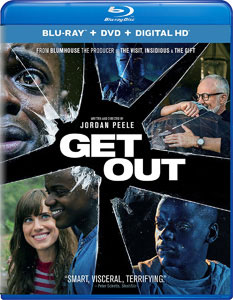“Get Out” (now available on pay-per-view streaming) is the latest example of how a horror movie can be an effective vehicle for making a social statement. When I read the Amazon description that notes the race of the characters – a Caucasian girl brings her African-American boyfriend to meet her parents at their lake house – I hoped that was merely the starting point, because I wanted a few good scares more than a message. Race does end up being central to the story, but in such a sneaky way that I ultimately rate “Get Out” a near-masterpiece of “Twilight Zone”-esque storytelling.
Firstly, Jordan Peele’s (“Key & Peele”) directorial debut (he’s also the writer) works as a horror movie. Chris (Daniel Kaluuya) ventures through the house at night and housekeeper Georgina (Betty Gabriel) stiffly crosses the path behind him, accompanied by a blast of music (just because it’s an old trick doesn’t mean it doesn’t work). Groundskeeper Walter (Marcus Henderson) comes running straight at Chris for no apparent reason. It gets your heart racing, but crucially, it gets the wheels of your brain spinning along with Chris’: What is the deal with these people?
The tension of “Get Out” comes from people acting strange. Girlfriend Rose Armitage (“Girls’ ” Allison Williams) assures Chris it’s just a case of white people (and their black servants, as it were) acting self-conscious around a black person. Rose’s dad, Dean (Bradley Whitford, nicely transitioning to father roles), keeps calling Chris “My man.” Mom Missy (Catherine Keener) offers to hypnotize Chris to rid him of his smoking habit. Brother and MMA enthusiast Jeremy (Caleb Landry Jones) praises Chris’ physique and genetic makeup.
It’s not out of racism, we think, but out of a desire to show how cool they are about race. If we’re being honest, many of us white people in America wonder if we should do something extra to show a member of a minority race that we are comfortable around all races.
Or IS there something more to the Armitages’ behavior? When Chris’ best bud Rod (Lil Rel Howery, in an entertaining turn) warns against the trip, it might be a legitimate warning rather than mere joshing. And it’s what Rod warns against that pushes “Get Out” into classic territory.
But a SPOILER WARNING is needed before I go further.
The brilliance of “Get Out” is that it makes every white person in the movie into a villain, and allows us to feel what it’s like to be a black person in America in 2017 — without coming off as heavy-handed.
The genre and structure allow Peele to pull off this improbable trick — not just the horror and thriller aspects, but the sci-fi angle. Dean can afford the beautiful house and acreage because he’s the leader of a secret cabal that kidnaps black people and body-snatches them. And creepily so: When Dean transplants the brain of one of these feeble white people – Jim (Stephen Root), in particular, eyes Chris’ body – into you, just a little bit of your essence is still trapped in there.
The transplant scene itself is wiggins-inducing, too, as Dean surgically removes the top of Jim’s head, tossing the skin and top of the skull into the trash and exposing the brain.
It’s chilling to think back at the odd behavior of Georgina, Walter and Andrew (“Atlanta’s” Lakeith Stanfield) and realize the explanation for it. Their lack of “black” mannerisms – a curt handshake instead of a fist-bump – isn’t because they, as Chris puts it, “missed the movement,” but because they are old white people in black bodies.
This description makes it seem like “Get Out” trades in hoary stereotypes, and I suppose it does, but it works because Chris is the audience surrogate, with only Rose as an ally in this increasingly bizarre environment. (If “Get Out” brings to mind issues of stereotyping and cultural appropriation – it’s never been more literal! – that just makes it a richer film.) Sure, she sympathizes, but on the other hand, the Armitages are her family. When it turns out Rose is in on the plan, too, it’s two nightmares rolled into one: 1) The person Chris thought he knew best is a brilliant sociopath, and 2) he’s all alone.
So I simultaneously related to Chris but also felt like I was getting a glimpse of a perspective I can never fully have: what it’s like to be black in a mostly white society. There’s a little bit of anxiety beneath the surface of any situation.
This isn’t to say I’ve never been a minority in a given group; I’ve attended a women’s basketball game. Nor is it to say I believe in collectivism; I think people are individuals more than they are a group member. Nor do I think everything is about race; most things are not.
That having been said, “Get Out” is an eye-opener. It makes me realize I don’t usually watch movies or TV shows with majority black casts because I feel they’re not aimed at me. (However, I feel compelled to point out that “Atlanta” was my No. 1 show of 2016, so when I make exceptions, they are smart ones!) If I had known the message of “Get Out,” I might have avoided it; Peele effectively tricked me into watching it by positioning it in the horror genre, but I’m glad he did.
It comes back to the “They’re not racist, they’re just awkward” premise at the film’s outset. Most people are not racist. However, not being racist is not the same as understanding what it’s like to be in another man’s shoes. “Get Out” brings me a little closer to understanding.


